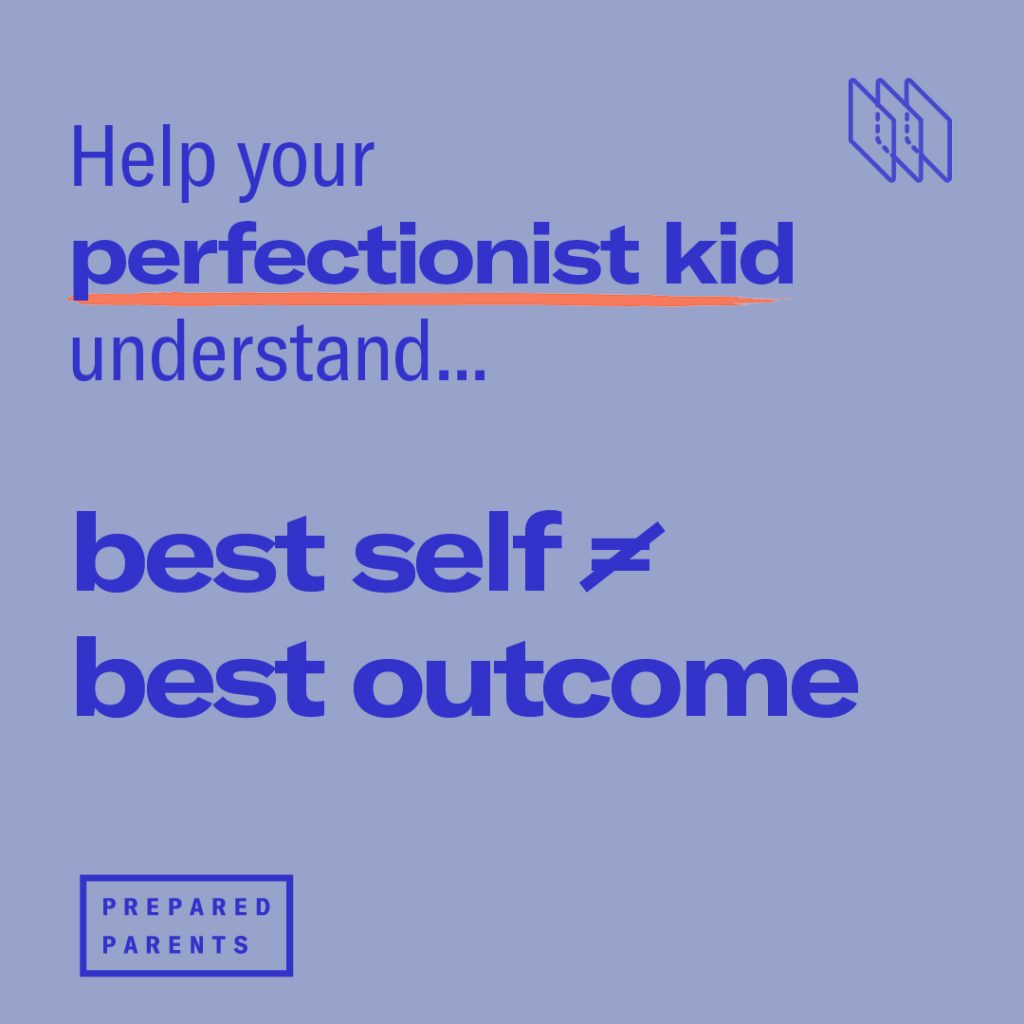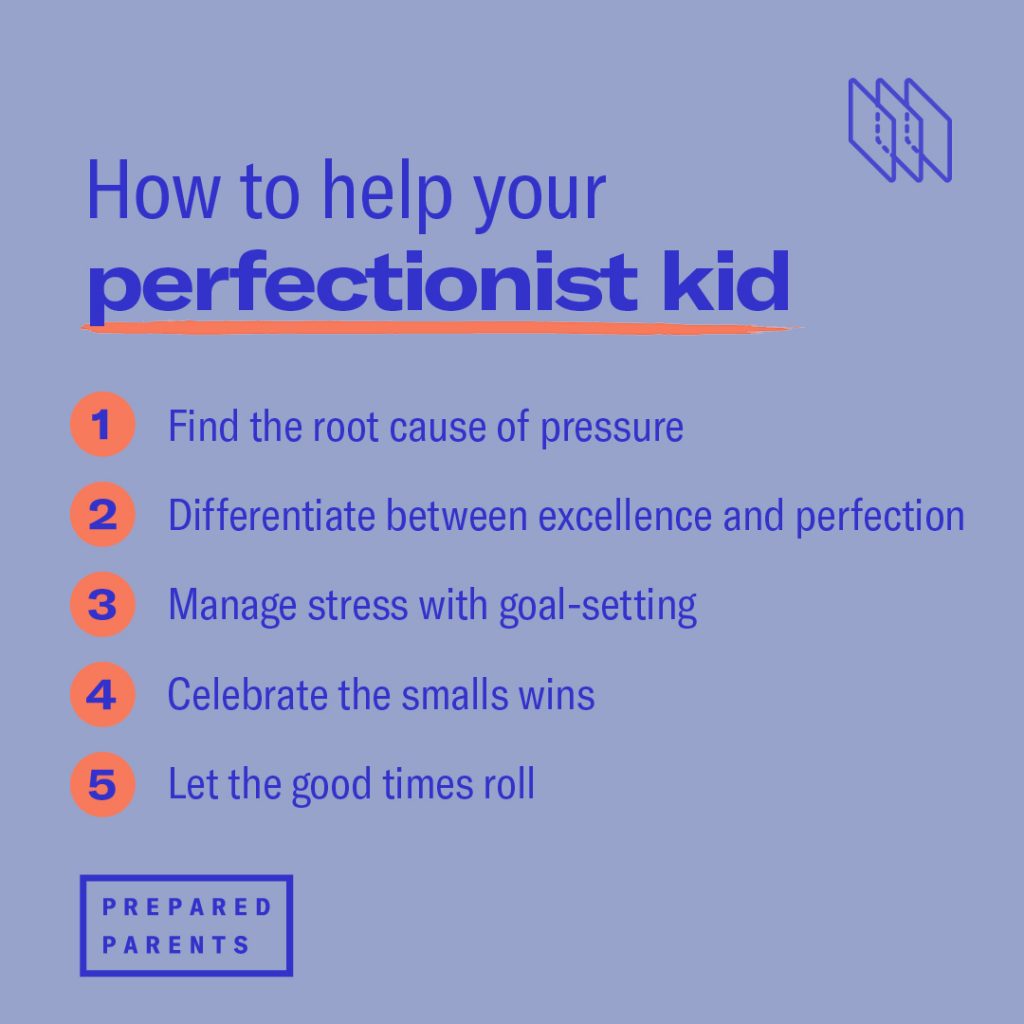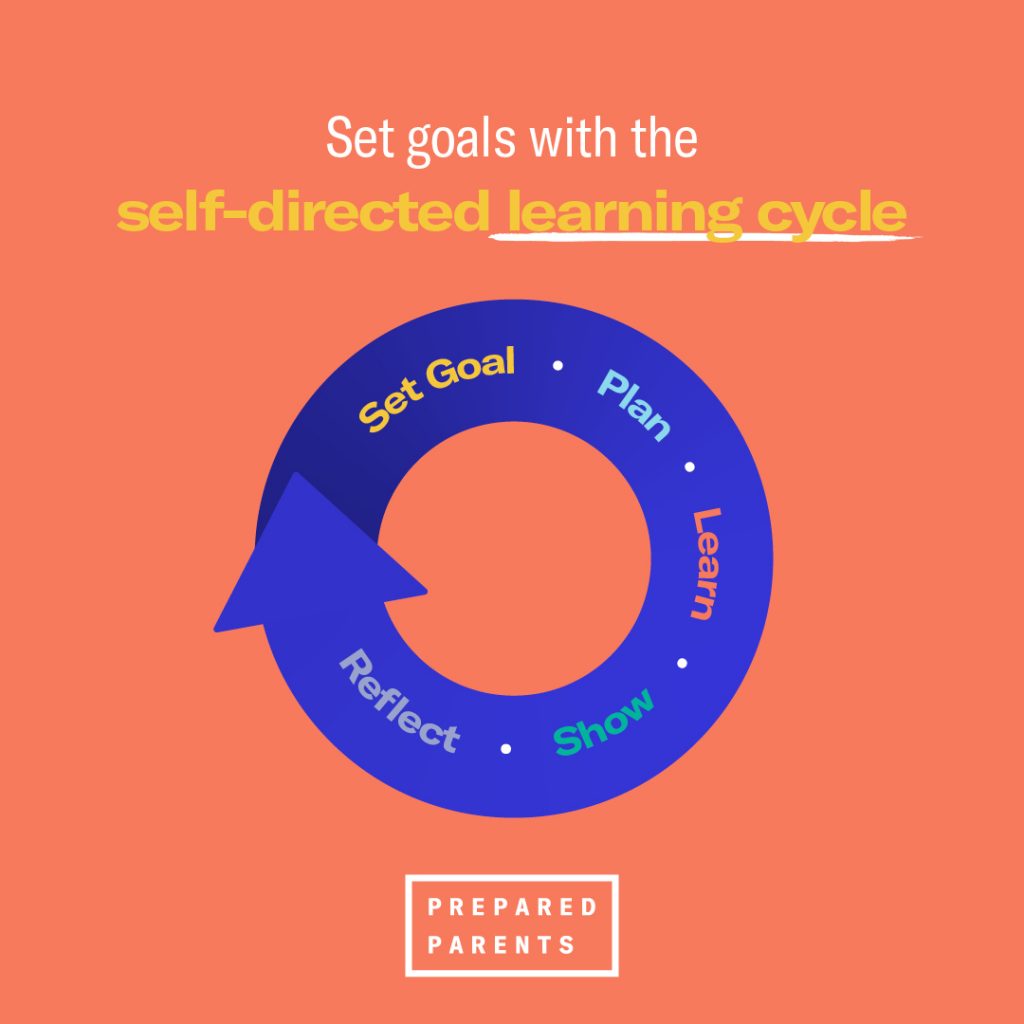Perfectionists get a bad rap for being overly-confident, overly-controlling, overachievers. You might think of the kid with all As or the all-star goalie when you think of perfectionist kids. But perfectionists are very different from high achievers.

High achievers have growth mindsets, enjoy toiling away at their work, and can overcome setbacks with ease. Perfectionists, on the other hand, feel immense pressure—either from themselves or others—to do everything right and can be easily crushed by failure. They often suffer from anxiety, a fear of failure, and uneasiness about feeling out of control. So, what do they do? Perfect, perfect, perfect. They take every opportunity to control any and everything within their grasp. And when things don’t go their way, they crumble.
All of that pressure rears its head in the form of stress and anxiety, which come with physical, mental, social, or emotional side effects. Your kid might get stomach aches or have trouble sleeping, for example. Or, despite all of their achievements, they may actually lack confidence, because they’re the victim of negative self-talk, putting themselves down every time they fall short of their high expectations. They may even have trouble making or keeping friends, because they’ve deprioritized relationships over ticking off deadlines while struggling to meet unattainably high standards.
These unhealthy perfectionist habits may seem harmless, but they can set a kid up for failure as an adult.
The tendency for some kids to overwork themselves tends to kick in during adolescence, when kids suddenly become more socially aware and start to compare themselves to and seek the approval of others. Younger kids, though, are not immune and can exhibit telltale signs of perfectionism as toddlers through meltdowns, isolation, self-criticism, and procrastination.
Help your kid understand and cope with their perfectionist tendencies by taking the following five steps:

Step 1: Find the root cause—there are different flavors of perfectionism
Is your kid feeling pressure from others, or are they truly putting all the pressure on themselves? Pioneers of perfectionism studies Paul Hewitt and Gordon Flett developed the multidimensional perfectionism scale to diagnose specific subtypes of perfectionism. The two that are most relevant for self-pressure are self-oriented perfectionism and socially-prescribed perfectionism.
- Self-oriented perfectionism
If your kid is naturally motivated to achieve, without any external pressure from friends, classmates, teachers, or parents, that may actually be great news—many self-oriented perfectionists actually have a high level of intrinsic motivation, because they get joy out of what they do. The trick is helping them find a balance in all that they strive to do. - Socially-prescribed perfectionism
In many cases though, a kid’s perfectionism can be primarily socially-prescribed—that is, they may be experiencing an unhealthy level of pressure and expectation from others. Are you putting too much parental pressure on them, or going a little too hard when they don’t meet your expectations, for example? Or do they run in a group of high achievers and feel constant pressure to keep up, whether that be with grades, extracurriculars, or even seemingly trivial pursuits, like maintaining a social media presence or having the best hair?
Step 2: Make it clear that “best self” doesn’t mean “best outcome”
There’s a difference in striving for excellence and striving for perfection. Help your kid understand that difference. Excellence and being your “best self” is about putting forth our best effort and meeting high standards that are within reach—perfection is about holding ourselves to impossible standards and often criticizing ourselves when we can’t meet them.
Dr. Marc Brackett and Dr. Robin Stern—director and associate director, respectively, of the Yale Center for Emotional Intelligence—explain in a recently co-authored article that being your “best self” is about having your actions align with your values and feeling as if you’ve done your best work. It’s not always about getting the best outcome—it’s about learning from the experience.
Reframing “best self” will help your kid develop a growth mindset and grow—instead of crumble—in the face of failure. In fact, failure can be even more important for perfectionists because it hits at the heart of their fear—and helps them practice overcoming it.
Step 3: Cut stress with goal-setting
Part of the stress of perfectionism is taking on too much and then melting down when it becomes unbearable. Help your kid cut that stress with goal-setting—focus on setting high, but achievable goals.
Kick off with a candid and caring conversation with your kid—commending them for the strong effort they put into their work—having a good work ethic is actually a great trait! Recognizing effort rather than outcomes can help your kid find intrinsic value in their achievements. Give specific examples to really drive home the positive aspect of their hard work.
Then, get real about your concerns. Share that you want to see them grow into their best self, and you’re worried that nightly midnight study sessions, missed hangouts with friends, and an overpacked schedule are wearing them thin. Let them know that there are other ways to find pride in their aspirations and achievements, and you are there to support and help.

Sometimes all it takes is a one-on-one conversation to identify a problem and take that first step toward a solution. Use the Self-Directed Learning Cycle to help your kid set goals, and then maintain daily Check-Ins and Check-Outs as touchpoints to stay in-the-know about your kid’s journey, emotions, and latest obstacles. Because your kid is likely naturally inclined to setting and achieving goals, this process may be an ideal way to break their overworking habit.
Step 4: Reward effort and celebrate small wins
Positive reinforcement can help your kid break a habit. Research shows that it takes roughly two months to form a new habit. In those first two months of goal-setting and tracking, keep a strong eye on your kid’s progress, focusing on rewarding their effort. Instead of focusing on the moment when they achieve a big goal, narrow in on the small steps that got them there. For example, your kid may set a goal to log-off of their computer at 10pm every night for a week—instead of focusing on that final day of the week, or scoffing when they stay on too late one night—look at the intention they set to achieve their goal. It takes a lot of dedication, for example, to set that 10pm goal and realize at 10pm that you’re going to need an additional 30 minutes to finish this math assignment. Powering through for 30 more minutes may actually be the best decision; after all, strategy-shifting is a power behavior of self-directed learners. Make sure to praise the effort, not the fixed traits: commend their growing time-management skills instead of how smart and talented they are.
Along the way, remind your kid that small wins are signposts that lead to bigger wins later. Every small win will keep them motivated thanks to the power of progress, evidence-based research that suggests the single most important motivating factor for a person is to simply make progress in meaningful work.
Step 5: Let the good times roll
After all of that goal-setting, make sure to take time to laugh, love, and tell your kid how proud you are of their self-improvement and holistic focus on not just their achievements, but also their physical and mental health. Then take a break, for crying out loud! After all, all fun and no play didn’t just make Jack and Jill dull kids, it also affected their healthy development; free time and play are essential to developing emotional control, social competency, personal resiliency, and curiosity.
To help your kid blow off a little of stress, escape to the great outdoors or find peace in a mindful moment together. If your kid thrives on planning, schedule in fun time. Be an active part of sharing in the benefits of your kid’s newfound sense of priorities and balance.

